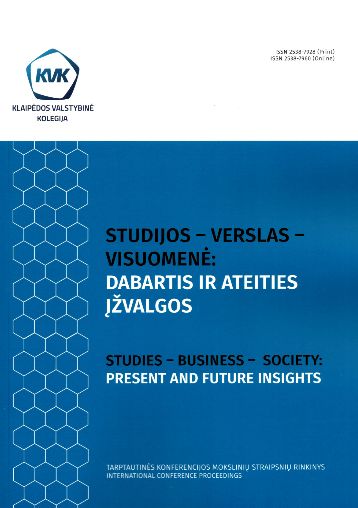ANKSTYVOJO AMŽIAUS VAIKŲ PAŽINIMO KOMPETENCIJOS UGDYMO(SI) GALIMYBĖS
DOI:
https://doi.org/10.52320/svv.v1iVII.253Reikšminiai žodžiai:
Ankstyvasis amžius, pažinimo kompetencija, ugdymas per atradimus, bandymai ir eksperimentaiSantrauka
Straipsnyje, remiantis mokslinės literatūros analize bei atlikto tyrimo duomenimis, aptariamos ankstyvojo amžiaus vaikų pažinimo kompetencijos ugdymo galimybės. Straipsnyje gilinamasi į problemą, kaip skatinti ankstyvojo amžiaus vaikų pažinimo kompetencijos ugdymą(si) per atradimus, bandymus, eksperimentus. Tyrimo tikslas: atskleisti ankstyvojo amžiaus vaikų pažinimo kompetencijos ugdymo(si) galimybes. Tyrimo metodai: mokslinės literatūros ir dokumentų analizė, apklausa raštu, apklausa žodžiu, duomenų kiekybinė ir kokybinė analizė. Straipsnyje analizuojama pažinimo kompetencija kaip viena svarbiausių sričių, vaiko ugdymui(si), kurią sudaro: smalsumas, domėjimasis, informacijos rinkimas ir apdorojimas, aktyvus aplinkos tyrinėjimas, padarinių prognozavimas, žinių, supratimo ir patirties kritiškas interpretavimas bei kūrybiškas panaudojimas. Išugdyta pažinimo kompetencija skatina žmogų domėtis ir suvokti įvairius reiškinius, dėsnius, leidžia įprasminti ir panaudoti kaupiamas žinias, ugdo kritinį mąstymą bei mokėjimą mokytis, kurie yra reikšmingi tolimesniame vaiko gyvenime. Patirtinis ugdymas(is) per atradimus, bandymus ir eksperimentus suteikia vaikui galimybes aktyviai veikti ir kurti sąveikoje su kitais, sėkmingai integruotis į bendruomenės gyvenimą, išbandyti savo prigimtinius gebėjimus ir lengviau prisitaikyti prie aplinkos. Ankstyvojo amžiaus vaiko ugdymas(is) ypatingas tuo, jog yra orientuotas į vaiko poreikių tenkinimą, jutiminės patirties plėtojimą, atitinkantis vaiko amžiaus galimybes, skatinantis vaiko savarankiškumą ir saviraišką. Tyrimo rezultatai atskleidė: svarbu ugdyti vaikų patirtinį ugdymą(si) jau ankstyvajame amžiuje, o tinkamiausias būdas pažinti aplinką yra žaidimas. Respondentai supranta, kad šeima ir pedagogai turėtų tapti ugdymo(si) partneriais, įsitraukdami į vaikų pažinimo kompetencijos ugdymą(si) įstaigoje/grupėje, todėl veikia įvairiais būdais: bendradarbiaudami su pedagogais, kurdami priemones, tobulindami ugdymo aplinkas.
Atsisiuntimai
Publikuota
Numeris
Skyrius
Licencija
Autorių teisės (c) 2022 Ilvija Pikturnaitė; Lina Valevičė, Algimantas Bagdonas

Šis darbas licencijuotas pagal Creative Commons Attribution 4.0 tarptautinę licenciją.

Atskiri straipsniai yra skelbiami „Open Access“ pagal „Creative Commons“ licenciją CC-BY 4.0, leidžiančią neribotai naudoti, platinti ir atgaminti betkokioje laikmenoje, su sąlyga, kad nurodytas originalus autorius ir šaltinis. Autoriai išlaiko autorių teises į savo straipsnius, tačiau suteikia Klaipėdos valstybinei kolegijai pirmojo leidinio teisę.

